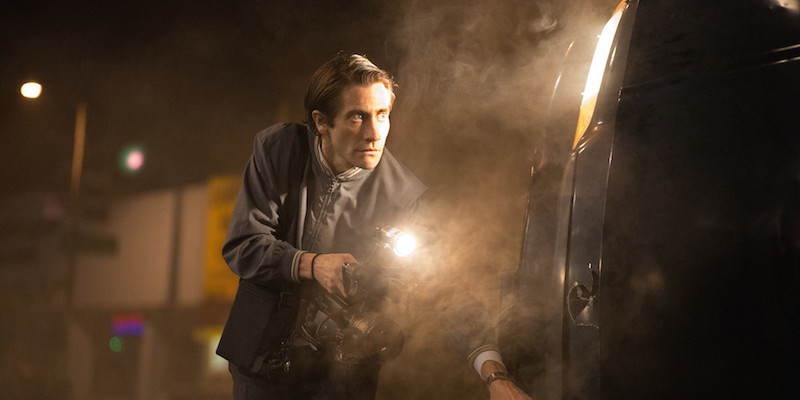The Character Arc of Nightcrawler
Ross Gale
 “A novel happens to any one of us when we give ourselves over to it.” So says the novelist Alice McDermott. But what happens when the novel, or in this case, the story, gives itself over to the character? The result is a movie like Nightcrawler. Written and directed by Dan Gilroy and set in present day L.A., the dialogue of Nightcrawler, all of it, every sentence, is a negotiation. Lou (played by a gaunt Jake Gyllenhaal) negotiates the entire movie. He negotiates payments, job positions, relationships, and scenes.
“A novel happens to any one of us when we give ourselves over to it.” So says the novelist Alice McDermott. But what happens when the novel, or in this case, the story, gives itself over to the character? The result is a movie like Nightcrawler. Written and directed by Dan Gilroy and set in present day L.A., the dialogue of Nightcrawler, all of it, every sentence, is a negotiation. Lou (played by a gaunt Jake Gyllenhaal) negotiates the entire movie. He negotiates payments, job positions, relationships, and scenes.
Gilroy describes what he was doing with Lou’s character as opposing tradition. "There’s no character arc! When I started to write the character I realized, ‘this guy isn’t going to change.’ Every film you’re commissioned to write is all about an arc; usually the arc is that the world creates a change in the character, usually for the better. To not have an arc, the messages and ideas in the film became more prominent.”
Gilroy begins with an evil character and ends with an evil character. But you can’t describe Lou as a flat character because his change—his arc—is industrial rather than moral. He begins at the bottom and builds his own successful business. Lou is an American success story. He negotiates and manipulates himself to the top. More specifically, Nightcrawler is a critique of L.A. culture. A magical place we imagine has long forgone any moral direction for the spotlight. Lou secures his place in the spotlight as the story’s antihero.
While we may not approve of Lou’s actions, we’re captivated by his end goal and how he chooses to eliminate the competition, negotiate deals, and curate his trophy case. In one of the most intense scenes, Lou creates a violent meeting between gang member and police officers. He manipulates the situation for the perfect ingredients and then turns on his camera to film the carnage.
Nightcrawler reveals an exaggerated and virtually realistic capitalist-driven world where everyone plays to win. Where words are only used to negotiate and death and violence become the daily dose of entertainment. Gilroy may not see a character arc to Lou, but Lou changes. He becomes more of a reflection of ourselves and where we could all be headed. That's a fascinating story in itself and a reminder of cultural forces defining the narrative arc of our lives. If Lou's narrative path can oppose tradition, is it possible we have that same power?